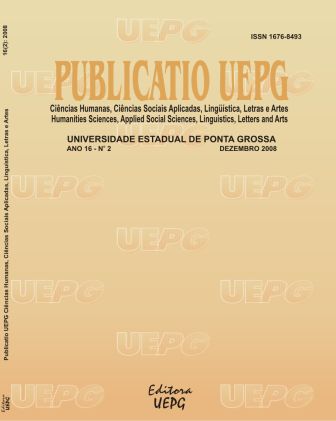POLÍTICAS PÚBLICAS E EDUCAÇÃO NO E DO CAMPO: FORMAÇÃO DOCENTE - Doi: http://dx.doi.org/10.5212/PublicatioHum.v.16i2.201207
Palavras-chave:
Políticas públicas, Educação do campo, Formação docente,Resumo
Evidenciamos neste debate sobre a formação do educador camponês brasileiro, a territorialização do saber com o espaço urbano predominando na produção e socialização de conteúdos ofi ciais sobre o rural. Atuando na formação docente, constatamos a não inclusão de conteúdos, temáticas, pesquisas e estudos nos cursos de licenciaturas sobre a vida no campo como diversidade cultural na compreensão das particularidades dessa formação. A Educação do Campo envolve os assalariados rurais temporários, posseiros, meeiros, arrendatários, acampados, assentados, reassentados, atingidos por barragens, agricultores familiares, vileiros rurais, povos da fl oresta, indígenas, ilhéus, quilombolas, pescadores, ribeirinhos e outros, que retratam a diversidade sócio-cultural. Nessa perspectiva, o projeto educacional que abrange a formação de educadores e educadoras do campo foge à lógica formal do mercado capital, forjando práticas coletivas na mística da esperança de ocupação do campo (zona rural) e do campo educacional como utopia a ser realizada. Essa ausência de projeto político de formação, como observamos, não é um fato isolado. É estruturalmente compreensível, dada à conjuntura política e econômica da sociedade brasileira e mundial no início do século XXI. A racionalidade técnica que se sobrepõe no sistema educacional formador é refl exo da hegemonia na atual sociedade, reduzindo os problemas éticos, sociais e políticos em problemas técnicos.
In this discussion about the education of Brazilian rural teachers we point out the existing segregation of knowledge, with the urban areas prevailing over rural areas in the production and socialization of offi cial contents. It has been noticed that in teacher education courses there is the exclusion of contents, themes, research and studies about life in the country as a cultural diversity in the understanding of the specifi c issues concerning the education in that context. Rural education involves temporary rural workers, settlers, tenant farmers, share croppers, squatters, populations in areas where dams broke, family farmers, people living in the forest, indigenous populations, island populations, quilombola populations, fi shermen, populations that live along rivers and other types of workers that portrait this sociocultural diversity. From this perspective, the educational project which includes teacher education of rural teachers does not follow the formal logic of capitalism, creating practices in the hope of occupying the rural areas and the educational field as an utopia to be achieved. The absence of a teacher education political project is not an isolated fact. It is structurally understandable given to the political and economic situation of Brazilian and world society in the beginning of the 21st century. The technical reasoning present in the educational training system mirrors the hegemony in current society, reducing ethical, social and political problems to technical problems.
Keywords: Public policies. Rural education. Teacher education.
Downloads
Downloads
Publicado
Como Citar
Edição
Seção
Licença
 Site licenciado: Creative Commons Atribuição 4.0 Internacional.
Site licenciado: Creative Commons Atribuição 4.0 Internacional.
Esta licença permite que outros distribuam, remixem, adaptem e criem a partir do seu trabalho, mesmo para fins comerciais, desde que lhe atribuam o devido crédito pela criação original. Este posicionamento está de acordo com as recomendações de acesso aberto da Budapest Open Access Initiative (BOAI).





